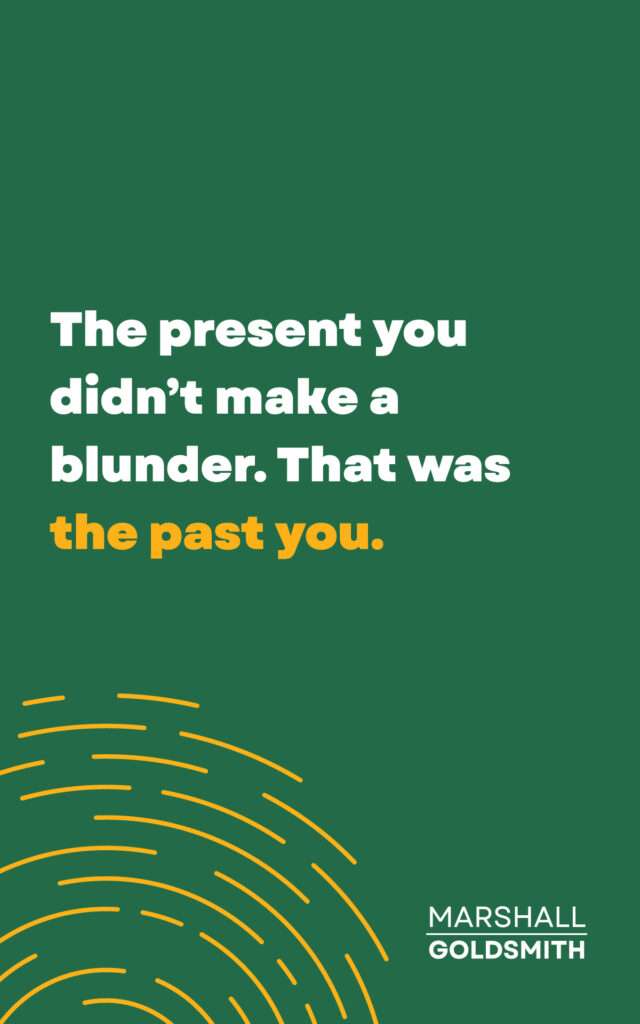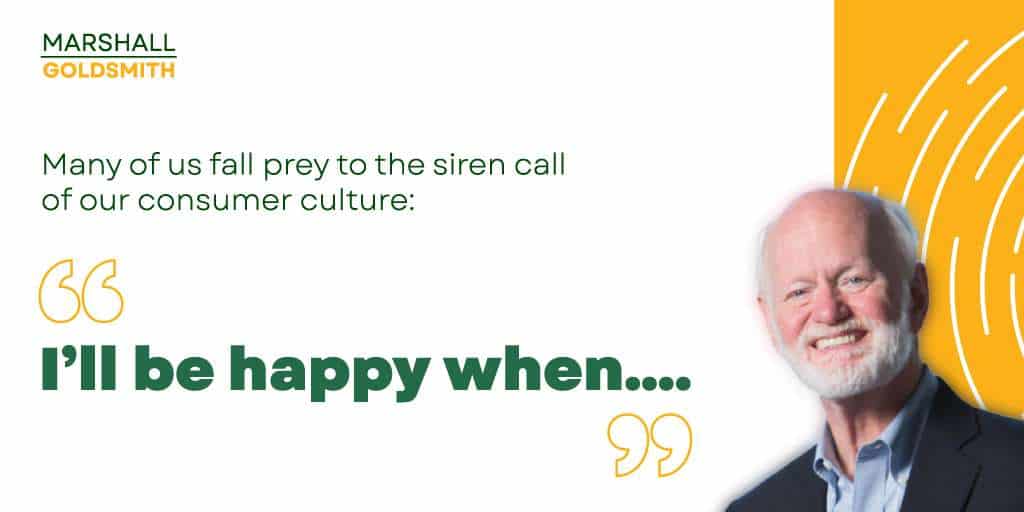Playing Favorites By Marshall Goldsmith There’s a reason I devote...
Many life coaches today make a living by showing people how they can find happiness. There have been several recent bestsellers, such as Greetchen Rubin’s The Happiness Project, which explores the ways in which we can become happier in our lives. Much of the advice from these writers and thinkers involves being attentive to the small things, being appreciative of the moment, not taking for granted the good we already have.
Of course, despite the popularity of these books and these notions, they go somewhat against one of the prevailing notions of our modern society: Happiness is just around the corner — if we buy more, dress right, drive the right car, get the biggest raise, apply the most alluring perfume.
Happiness coaching is popular because many of us still, despite our best wishes, fall prey to the lure of the siren call of our consumer culture: “I’ll be happy when….”
As I mentioned, some of my high-achieving clients find it hard to grasp the concept of my Every Breath Paradigm since their goals are so different from genuine fulfillment. These clients are always either looking forward or backward — the present moment doesn’t come into it.
Gradually I chip away at my clients’ forward- and backward-looking attitudes. When clients beat themselves up over a recent or old blunder, I say “Stop,” and ask them to repeat the following: “That was a previous me. The present me didn’t make that blunder. So why am I torturing myself for some past error that the present version of me didn’t commit?”
Then I have them make the universal hand gesture for shaking off a problem and repeat after me: “Let it go.” As silly as this routine may sound, it works. Clients not only begin to see the futility of belaboring the past, but they also embrace the psychically soothing notion that the blunder was committed by someone else—a previous self. They can forgive that previous self and move on. In my initial meetings with clients, I may employ this routine a half dozen times in a one-hour conversation. But eventually they get it—usually at a critical or fraught moment when they finally appreciate that the Every Breath Paradigm has utility in their daily life, not just in their career.
Ten years ago, I began coaching an executive in his early forties who had been tapped to be the next CEO of a media company. Let’s call him Mike. His natural leadership skills set him apart from the standard C-suite issue of smart, motivated, underpromise-and-overdeliver types. But he had some rough edges that needed smoothing. This was where I came in.
Mike was a charmer when it served his interests. But he could be insensitive and dismissive to people less useful to him. He was super-persuasive, but sometimes aggressive when people didn’t immediately concede that he was right and they were wrong. He was also too visibly

pleased with his success. This gave him an off-putting air of entitlement. He was special — and never let people forget it.
Insensitive, rarely wrong, and entitled — these weren’t career-killing flaws, just issues that came up in my 360-degree reviews with his colleagues and direct reports, which I shared with him.
He accepted the criticism with grace, however. In less than two years (through a process that is the essence of one-on-one coaching), he changed his behavior to his own satisfaction and, more important, in the opinion of his peers (you need to change a lot to get people to notice even a little).
We remained friends after he became CEO, talking at least once a month about his job and, increasingly, about his family life. He and his wife—college sweethearts—had four grown kids, all out of the house and on their own. The marriage was solid after years of tension when Mike was focused on his career while his wife, Sherry, raised the kids and built up a seemingly unshakable resentment of Mike’s self-absorption and insensitivity.
I asked him, “Is Sherry wrong?” I pointed out that, if he had been perceived as insensitive and entitled at work, he probably was the same at home.
“But I’ve changed,” he said. “She’s even admitted that. And we’re much happier. Why won’t she let it go?”
I explained the Every Breath Paradigm to him, stressing how hard it was for Westerners to conceive that we are not a unitary mass of flesh and bone and emotions and memories, but rather a steadily expanding multitude of individuals, each one time stamped in the moment of our most recent breath—and reborn with every breath.
I told Mike, “When your wife thinks about her marriage, she can’t separate the previous Mike from the man who is her husband today. They’re one character to her, a permanent persona. It’s how we all think, if we’re not careful.”
Mike struggled with the concept. I understood. I was offering him a new paradigm, not a casual suggestion. We achieve understanding at our own pace.
A couple of years ago, he called me out of the blue, excitedly announcing, “I got it!” I had no idea what he was talking about, but it soon became clear that the “it” he mentioned concerned our Every Breath talks.
Mike described a conversation with his wife, Sherry, as they were driving back from a Fourth of July reunion with the kids and their partners and friends. Mike and Sherry were reliving the high points during the drive, pleased at how the children turned out, how engaging and helpful their friends were, how the kids did most of the cooking and cleaning up. Basically, they were congratulating themselves on their good fortune and their successful parenting.
Then Sherry said, “I just wish you had contributed more when they were growing up. I was so alone most of the time.”
“I wasn’t hurt by her words, or angry,” Mike told me. “I turned to her and said very calmly, ‘You’re right about that guy ten years ago. He was clueless about many things. But that’s not the guy in this car right now. He’s a better man now. Tomorrow, he’s going to be someone else trying to be a little better. Another thing—that woman who suffered back then is not the same woman today. You’re faulting me for the actions of someone who doesn’t exist anymore. It’s not right.’ ”
The car was silent for a long ten seconds. Then Sherry apologized, “You’re right. I have to work on that.”
Mike had required years—and an emotionally heightened situation to which Buddha’s teaching applied perfectly—to understand the Every Breath Paradigm. His wife got it in ten seconds.
Everyone works at their own pace. Understanding can be immediate or eventual. I’m okay with both timetables. I am always glad to be an accomplice in other people’s epiphanies.

Adding Too Much Value Won’t Get You There By Marshall...
C-Suite Master Class: No, But, However By Marshall Goldsmith Continuing...
The Doerr Institute: Expanding the Market for Coaches By Marshall...
Making Leadership Development Part of the College Degree at Rice...
Sanyin Siang – Winner of the Thinkers50 Marshall Goldsmith Coaching...
Thinkers50 Marshall Goldsmith Distinguished Achievement Award in Coaching – Nominees...
Leading with Influence: What Is Influence360°? By Marshall Goldsmith Founder...
Are You a Dominator, Manipulator, Persuader or Influencer? By Marshall...
Leading with Influence: Redefining Modern Influence Part 2 By Marshall...

My mission is simple. I want to help successful people achieve positive, lasting change and behavior; for themselves, their people, and their teams. I want to help you make your life a little better. With four decades of experience helping top CEOs and executives overcome limiting beliefs and behaviors to achieve greater success, I don’t do this for fame and accolades. I do this because I love helping people!
As an executive educator and coach, I help people understand how our beliefs and the environments we operate in can trigger negative behaviors. Through simple and practical advice, I help people achieve and sustain positive behavioral change.